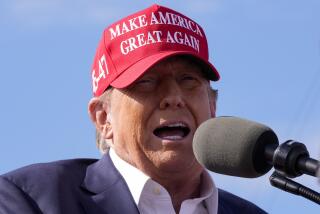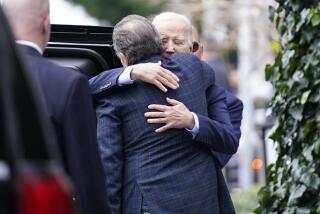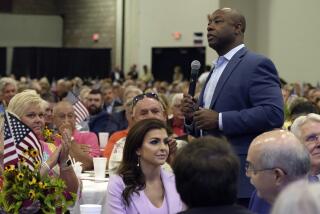McCain Nears S.C. Spending Limit
- Share via
WASHINGTON — Just as he nears the finish in a neck-and-neck race for the critical South Carolina primary, John McCain is handicapped by a spending limit on his campaign that does not apply to rival George W. Bush.
When Bush decided months ago not to accept federal matching funds, he freed his campaign from state-by-state limits on spending by individual candidates as well as an overall national cap.
What this means in South Carolina, seen as a must-win primary by both Republican rivals, is that the outcome could be influenced by one candidate’s participation in a federal election system designed to level the financial playing field--and the other’s rejection of it.
“It’s like we are handcuffed to a certain degree and they are free to fire at will,” said John Weaver, the McCain campaign’s senior political strategist.
“This is what the system was designed to prevent--that one candidate would be able and willing to spend millions of dollars over the cap. When you combine that with their affiliated interest groups, we’re facing an onslaught of money,” he added.
The cap for spending in South Carolina is $1.5 million, but technical accounting rules give candidates leeway to spend up to about $3 million in the state without breaking the rules, according to Federal Election Commission spokesman Ian Stirton.
Because McCain’s spending in the state already is closing in on that cap, his campaign has stopped buying advertising time and is relying on volunteers to get out the vote.
“If I didn’t have a cap, I’d be spending more on TV because this is a much bigger market than New Hampshire,” said McCain campaign manager Rick Davis.
The McCain campaign says it has spent $2.5 million on advertising alone, leaving little room for other electioneering costs. Bush aides believe McCain has spent $2.8 million on ad time, which would put him even closer to the cap.
Bush, who raised a record-breaking $67 million in 1999, already has spent more than the cap in South Carolina, saturating the state’s airwaves with advertisements and wooing hundreds of thousands of voters with a massive telephone campaign. His campaign has spent $3 million on television and radio time for commercials scheduled to run through Saturday’s primary, according to Matthew Dowd, Bush’s media advisor.
McCain aides peg Bush’s ad spending at $3.5 million.
The Bush campaign would not say how much it has spent on its phone bank--staffed primarily by paid callers rather than volunteers--or on direct mailing.
Davis stressed that the campaign expects the squeeze of the federal caps to be greatest in South Carolina.
“In the other states they [the caps] are so big that we can’t reach them,” Davis said.
McCain’s campaign insists it will not bust the caps.
“We were a dime under the cap in New Hampshire, and we’ll be a nickel under the cap in South Carolina,” said Weaver, the campaign’s senior political strategist.
Bush, in contrast, has only his own cash flow and budget to consider when deciding how much to pour into a particular race.
In July, when Bush opted out of the public financing system, he was so far ahead in the polls he could not have predicted that South Carolina could be a turning point in the race for the nomination. But that choice gives him a powerful upper hand now.
“Now is when Bush’s decision to forgo the matching funds is benefiting Bush--some would say at the expense of the [federal election] rules set after Watergate,” said Larry Makinson, executive director of the nonpartisan Center for Responsive Politics.
“Bush got pretty much of a free ride when he decided he wasn’t going to accept the matching funds and follow all the restrictions,” he added.
As of the end of last year, Bush had raised about $68 million to McCain’s less than $16 million. McCain’s recent fund-raising efforts were boosted by his victory in New Hampshire, but he cannot match Bush in spending. His decision to receive public matching funds limits his primary campaign to roughly $40 million in overall spending nationwide.
Although the Bush campaign sidestepped the public financing system, it unapologetically shines a sharp spotlight on McCain’s spending.
“I do not accept federal matching funds, as you know,” Bush said on the trail in Saluda, S.C., on Monday.
“I do think that if you accept taxpayers’ money under federal matching funds you ought to conform to the spending limits that you’ve agreed to live under,” he added in an apparent slap at McCain.
But McCain has blasted Bush for opting out. “I’m in compliance with the law,” he said over the weekend. “He’s made a mockery of it. And he’s destroyed it forever.”
Bush said that if he wins the GOP nomination, however, he will accept federal funds for campaigning during the general election because “it’s the norm.”
The FEC has been urging Congress to end the state-by-state limits on spending by individual presidential candidates. The caps were loosened before the 1992 election campaign.
Candidates who take matching funds are audited by the FEC. If the audit determines that a campaign exceeded the spending limit, the FEC can ask the campaign to return some of the federal money it received or face civil penalties, Stirton said.
Times staff writers Mark Z. Barabak, Ronald Brownstein and Maria L. La Ganga contributed to this story from South Carolina.
More to Read
Get the L.A. Times Politics newsletter
Deeply reported insights into legislation, politics and policy from Sacramento, Washington and beyond. In your inbox three times per week.
You may occasionally receive promotional content from the Los Angeles Times.










